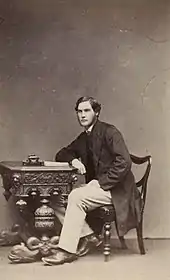William Henry Gladstone
William Henry Gladstone (3 June 1840 – 4 July 1891) was a British Liberal Party Member of Parliament, and the eldest son of Prime Minister William Ewart Gladstone and his wife Catherine née Glynne.



Life
Gladstone was born in Hawarden, Flintshire, Wales. He attended Eton College and read Greek and Latin at Christ Church, Oxford University. He was a member of parliament for a total of 20 years, representing Chester for three, Whitby for twelve and East Worcestershire for five.
A singer and organist, he was well versed in musical history, especially the development of Anglican church music. He wrote on musical topics, and one of the views he expressed was that choral church services were to be deplored because "the choirs often discourage the congregations from singing". He wrote the anthems "Gracious and Righteous" and "Withdraw Not Thou", and chants, anthems, introits and organ voluntaries. He composed the hymn tunes Hammersmith, to which "Dear Lord and Father of Mankind" is sometimes set, and Ombersley,[1] sometimes used for "Lord of All Being, Throned Afar".
William played for Scotland in the first unofficial England v Scotland Football International in 1870. He was one of two sitting members of parliament to play for Scotland in this match, the other being John Wingfield Malcolm, MP for Boston.[2]
When his mother's brother Sir Stephen Glynne died without heirs in 1874, the Glynne baronetcy became extinct, but William inherited the Glynne estates, including Hawarden Castle, which had in any case been the Gladstones' family home since his grandfather Sir John Gladstone had used some of his substantial fortune to rescue the Glynne family from bankruptcy in the 1840s.[3][4] He was appointed High Sheriff of Flintshire for 1888.[5]
He died in London on 4 July 1891; his son William Glynne Charles Gladstone inherited Hawarden.[6] His funeral at Hawarden was extremely well attended, and the poor of the parish were said to have "unmistakeably felt that they had lost a most kind and generous benefactor".[7]
References
- "Ombersley". hymnary.org. Retrieved 27 November 2020.
- Association of Football Statisticians: http://www.11v11.co.uk/index.php?pageID=466.
- Matthew, H. C. G. (2016) [2004]. "Gladstone [Gladstones], Sir John, first baronet (1764–1851)". Oxford Dictionary of National Biography (online ed.). Oxford University Press. doi:10.1093/ref:odnb/10786. (Subscription or UK public library membership required.)
- Veysey, A. Geoffrey (1981–82). "Sir Stephen Glynne, 1807–74". Flintshire Historical Society Journal. 30: 151–70 (158–61, 165–66).
- "No. 25798". The London Gazette. 20 March 1889. p. 1696.
- Williams, C. J.; Misra, A.-M. (2004). "Gladstone, Henry Neville, Baron Gladstone of Hawarden (1852–1935)". Oxford Dictionary of National Biography (online ed.). Oxford University Press. doi:10.1093/ref:odnb/38809. (Subscription or UK public library membership required.)
- "The Late Mr W. H. Gladstone". Wrexham Advertiser. 11 July 1891. p. 6 – via British Newspapers Online.
External links
- Hansard 1803–2005: contributions in Parliament by William Henry Gladstone
- Portraits of William Henry Gladstone at the National Portrait Gallery, London

- Works by William Henry Gladstone at Project Gutenberg
- Works by or about William Henry Gladstone at Internet Archive
- Leigh Rayment's Historical List of MPs
| Parliament of the United Kingdom | ||
|---|---|---|
| Preceded by Earl Grosvenor and Philip Stapleton Humberston |
Member of Parliament for Chester 1865–1868 With: Earl Grosvenor |
Succeeded by Earl Grosvenor and Henry Cecil Raikes |
| Preceded by Charles Bagnall |
Member of Parliament for Whitby 1868–1880 |
Succeeded by Arthur Pease |
| Preceded by Henry Allsopp and Thomas Eades Walker |
Member of Parliament for East Worcestershire 1880–1885 With: George Hastings |
Succeeded by George Woodyatt Hastings |